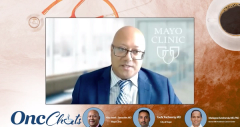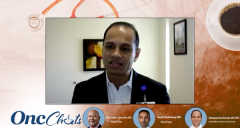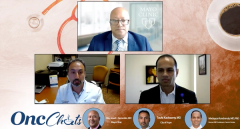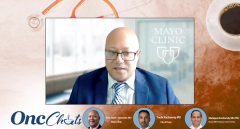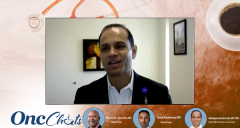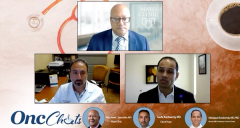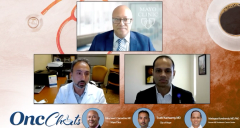
Examining the Promise of Multicancer Early Detection Tests: Existing Concerns
In this fourth episode of OncChats: Examining the Promise of Multicancer Early Detection Tests, Toufic A. Kachaamy, MD, Madappa Kundranda, MD, PhD, and Niloy Jewel J. Samadder, MD, discuss existing concerns regarding multicancer early detection tests.
Episodes in this series

In this fourth episode of OncChats: Examining the Promise of Multicancer Early Detection Tests, Toufic A. Kachaamy, MD, Madappa Kundranda, MD, PhD, and Niloy Jewel J. Samadder, MD, discuss existing concerns regarding multicancer early detection (MCED) tests.
Kachaamy: You mentioned the randomized control trial [RCT] that will be done in the United States. Is it multicancer early detection vs current screening?
Samadder: Yes, the Vanguard trial will be 3 arms at the start. There will be a standard cancer screening arm. Patients will get, based on their age, between 45 years and 80 years, colorectal cancer screening, breast imaging, cervical cancer screening, [or] possibly prostate and lung cancer screening. The other 2 arms will be 2 different MCED tests; they will both likely be blood-based tests. It’s unclear whether they will screen for 20 to 30 cancers or 5 cancers in a single organ system, for example, like gastrointestinal cancer. Those logistics will be worked out probably in Q1 of 2024, before the trial launches.
Kachaamy: While we’re awaiting the results of these trials, [is there] any concern about these leading to underutilization of currently proven screening [approaches, such as,] for example, colonoscopy. What’s your advice to someone who has this test available [and who is] waiting for the RCT? What do they do in terms of other cancer screening [approaches]?
Samadder: That’s a great question. I think there are 2 major worries with MCED. One, you just touched on right now. Does it lead to a false sense of security that may lead people to underutilize well-proven, well-evidenced cancer screening for breast, colon, and cervical [cancer]? That would be truly a negative outcome. We know those 3 I just mentioned have strong data [from] over the past decade. RCTs, or very large cohort observational studies, [have shown] that [these proven tests] reduce cancer incidence and mortality. As such, we need to make sure that we educate our patients when they do select such a test like an MCED that they are well informed about the limitations of this type of product, what cancers it could miss, and what the big unknowns [are] in terms of efficacy or outcome.
The other worry is, will this test—because as it stands now, it is a fairly costly out-of-pocket test—lead to disparities in underrepresented minority populations in terms of cancer screening and mortality eventually? You can imagine that certain populations will have more access to this type of out-of-pocket test than others will. So, will it lead to disparities in genomic medicine, precision medicine, and early cancer detection and screening? We need to have our eyes open [regarding] both of those [concerns].
In terms of how to craft this into clinical care, at Mayo Clinic, it really is going to be an approach that is going to cover all 3 of our campuses. Whichever door you come into in Phoenix, Jacksonville, or in Rochester, Minnesota, and our health system in the upper Midwest, you should be educated equally on what the benefits of this testing are vs the unknowns and the negatives, the risk of false positives and invasive procedures that may need to occur, the cost, the algorithm of care for diagnostic workup, and how the results are returned to patients. All that needs to be created in a format where patients receive it virtually possibly, and then are connected into our MCED clinic if they have a positive result.
The second thing I'll mention is, for any center that stands up a program like this, it would be wise to have a research institutional review board [IRB] in which these patients are enrolled. Even patients who are not participating in one of the company’s clinical trials that are developing these products or the large National Institutes of Health trial, who are paying out of pocket to do such a test should be enrolled in some type of pragmatic clinical trial. That is the only way we’ll be able to follow the data on patients receiving this clinically and identify how often it is leading to positive results and diagnostic workup leading to a cancer. We’re trying to do that at Mayo, with a 3-site pragmatic clinical trial IRB for patients who clinically decide to undergo testing and I would think other institutions would do the same. At the back of my mind, one of the risks I foresee is, you don’t want this to turn out to be anything like the Theranos controversy. The best way to avoid that is to have our eyes open, to educate patients about the limitations, and to have an IRB in place to follow the patients and collect the data.
Check back on Wednesday for the next episode in this series.


